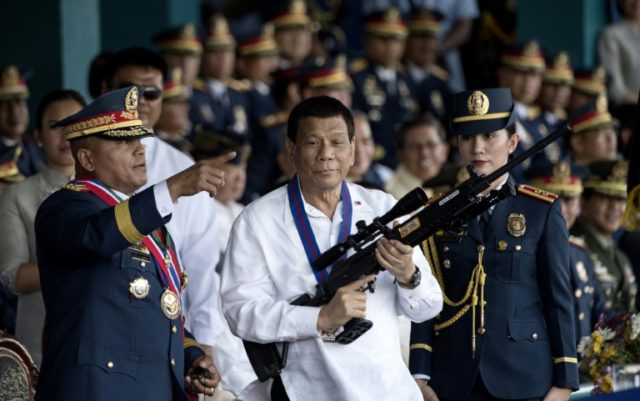Philippine President Rodrigo Duterte ordered the national police to release a report Tuesday accusing seven top members of law enforcement of drug trafficking, allegedly reselling drugs confiscated in raids to turn a profit.
Duterte has made these lists a signature of his tenure as president, an office he won largely on a promise to eradicate drug crime on a national scale. Rather than turn the spotlight on known criminals, Duterte has focused on identifying police officers, judges, mayors, and other politicians who allegedly abused their power to profit off of the illegal drug trade.
The Philippines is suffering through a nationwide drug epidemic – fueled in large part by “shabu,” or methamphetamine – that has devastated poor communities and ensnared thousands of young Filipinos in addiction. Duterte has repeatedly threatened to use his powers to kill suspected drug traffickers and emboldened police officers to kill during routine operations, outraging the international human rights community.
The “secret special report” published Tuesday, according to the Philippine Inquirer, is dated September 12, 2018, and lists among its culprits some of the highest ranking active and retired members of the Philippine Drug Enforcement Agency (PDEA) and Philippine National Police (PNP).
Atop that list is Ismael Fajardo, Jr., a dismissed ex-deputy director of the PDEA. The Inquirer notes that Fajardo was fired two days after the finalization of this report, which identified him as “a recycler of drugs and fabricator of stories.”
The report uses the term “recycle” to mean the sale of drugs confiscated by the police. Rather than keep drugs seized during police raids in evidentiary rooms, Fajardo is alleged to have stolen the drugs from police custody and sold them illegally.
“Initial background investigation disclosed that Fajardo accumulates wealth which is disproportionate to his salary as government employee. … as of 31 December 2014, he has declared a total net worth of P7.8 million,” according to the report.
Among the more lurid accusations against Fajardo in the report, the Inquirer reports, is that he raped a woman identified as Sandra Uy after her husband was arrested. Fajardo stands accused of using his authority to promise Uy he would help free Uy’s husband and forced her to allow him to use her bulletproof Toyota vehicle.
Former PNP Sr. Supt. Eduardo Acierto, one of the major figures in the police force working on anti-drug operations before being fired, was also on the list. Rather than trafficking in recycled drugs, however, the report accused Acierto of selling confiscated AK-47 firearms.
The police officers named in the report are S/Supt. Leonardo Ramos Suan, Supt. Lorenzo Cusay Bacia, Insp. Lito Torres Pirote, Insp. Conrado Hernandez Caragdag, and SPO4 Alejandro Gerardo Liwanag, according to CNN Philippines. All stand accused of similar drug trafficking crimes.
Duterte reportedly told media that the details in the report are the product of intelligence officers’ investigations and not formal charges against the individuals involved. The PNP responded to the report on Wednesday by promising a formal probe into the findings and, if appropriate, criminal charges.
“[S]ince their names were given already to the public, definitely an investigation, not only counter-investigation, but an investigation will [be done to] look into that report,” PNP spokesman and Chief Superintendent Benigno Durana, Jr., told reporters, according to the Manila Bulletin. The police officers involved have already been relieved temporarily of duty, Durana added.
Duterte warned the PNP in a speech in January that such an investigation would occur.
“Cleanse your ranks. Review their cases. Give me a list of who the scalawags are,” Duterte said in a speech to police officers that month. He called PNP officers “the most corrupt” and “corrupt to the core.” The speech announced a shift in strategy from targeting politicians to targeting police officers.
Duterte released his first list of accused drug traffickers in government in 2016, shortly after taking over the presidency featuring 150 people, most serving as mayors or other municipal officials. Publishing the list triggered a parade of dozens of local government officials appearing before the federal government and seeking to cooperate with the police, hoping to avoid an extrajudicial killing. Reports began surfacing in late 2016 of mayors traveling to the presidential palace crying and pleading with the govenrment not to kill them.
Some mayors, like Albuera Mayor Rolando Espinosa, expressed particular concern because the accusation meant they lost access to personal security. Police raided Espinosa’s home shortly after he appeared on the list, killing six personal security guard. Espinosa himself was killed in prison in November while awaiting trial.
Duterte subsequently expanded the list to over one thousand “barangay [neighborhood] captains, policemen, mayors, governors and judges”
Prior to the list published Tuesday, Duterte’s government most recently released a list of hundreds of allegedly drug-affiliated politicians in April.

COMMENTS
Please let us know if you're having issues with commenting.